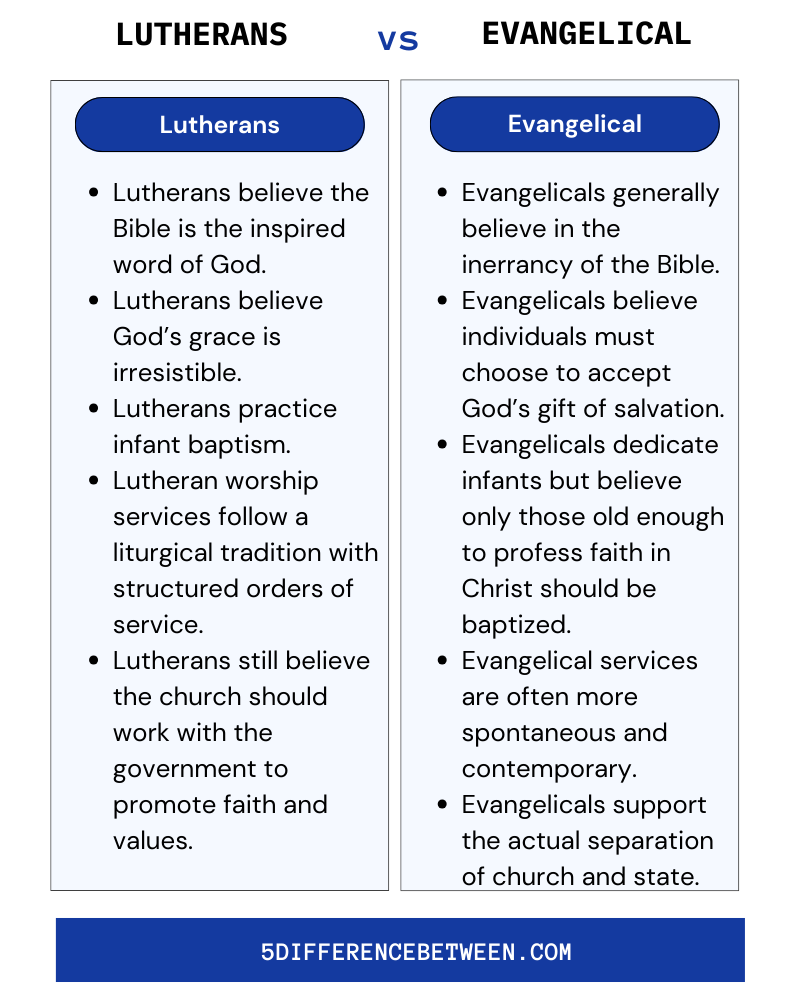The Lutheran and Evangelical branches of Christianity share some similar beliefs, but there are a few key differences in their doctrines and practices.
Origins and History: How Lutheran and Evangelical Traditions Emerged
The Lutheran and Evangelical faiths share some similarities, but their origins and history are quite different.
- The Lutheran Church
The Lutheran tradition traces back to the 16th-century Protestant Reformation in Germany. Martin Luther, a Catholic monk, spoke out against perceived abuses in the Catholic Church, like the selling of indulgences. He argued for a return to biblical principles of faith and grace. In 1517, Luther published his “95 Theses,” criticizing indulgences. This helped spark the Reformation and the establishment of the Lutheran tradition.
Also Read > Difference Between Town and City
- The Evangelical Movement
Evangelicalism emerged in the 1700s, emphasizing personal conversion and the authority of the Bible. Key leaders like John Wesley and George Whitefield helped spread the movement through revivals and camp meetings. Evangelicals emphasized a “born again” experience, in which people make a personal commitment to faith in Jesus.
While Lutherans and Evangelicals share a common Christian faith, their histories reveal some differences in beliefs and practices. But both traditions continue to impact the Christian faith today through active denominations and communities around the world.
Core Beliefs: Comparing Lutheran and Evangelical Doctrines
As Christians, Lutherans and Evangelicals share some core beliefs, but there are a few key differences in their doctrines.
- Salvation and Faith
For Lutherans, salvation comes through faith alone (sola fide), not by doing good works. Evangelicals also believe faith is essential for salvation, but some emphasize personal experience and a walk with Jesus.
- The Bible
Lutherans believe the Bible is the sole authority for the Christian faith. Evangelicals similarly regard the Bible as God’s word and the final authority, though some evangelicals interpret the Bible more literally.
- Sacraments
Lutherans recognize two sacraments: baptism and communion (or the Eucharist). They believe in infant baptism and that Christ’s body and blood are present (“consubstantiation”) in the communion elements. Most evangelicals only practice adult baptism and see communion as symbolic.
- Church Leadership
The Lutheran church has a defined leadership hierarchy, with bishops, districts, and synods. Evangelical churches typically have more autonomy, with leadership at a local church level.
While Lutherans and Evangelicals share a common faith in Christ, their doctrinal differences have shaped distinct denominational traditions. Yet both continue to spread the Gospel and make disciples, serving as partners in faith.
Lutheran vs Evangelical

Lutherans
- Lutherans believe the Bible is the inspired word of God, but that some books are more useful for doctrine than others.
- Lutherans believe God’s grace is irresistible.
- Lutherans practice infant baptism, believing it brings children into the faith.
- Lutheran worship services follow a liturgical tradition with structured orders of service.
- Lutherans still believe the church should work with the government to promote faith and values.
Evangelical
- Evangelicals generally believe in the inerrancy of the Bible, that it is without error in its original manuscripts.
- Evangelicals believe individuals must choose to accept God’s gift of salvation.
- Evangelicals dedicate infants but believe only those old enough to profess faith in Christ should be baptized.
- Evangelical services are often more spontaneous and contemporary.
- Evangelicals support the actual separation of church and state.
While sharing core beliefs, Lutherans and Evangelicals differ in their views on scripture, salvation, baptism, worship, and church-state relations. But together, they work to spread the Gospel and love of Christ.




